|
|
|
Sort Order |
|
|
|
Items / Page
|
|
|
|
|
|
|
| Srl | Item |
| 1 |
ID:
145103
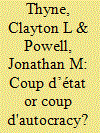

|
|
|
|
|
| Summary/Abstract |
This paper considers how coups impact democratization. Current research focuses on coups as a threat to consolidated and fledgling democracies. Policymakers have adapted to this viewpoint by treating coups as unjustifiable maneuvers that must be curtailed, with states frequently terminating aid and IOs suspending membership following a coup. While coups clearly confound democratic consolidation, it is notable that the vast majority of coups do not happen in democracies. Therefore, we focus on authoritarian regimes in seeking to discover how coups might open paths toward democratization. We first argue that successful coups should promote democratization because leaders have incentives to democratize quickly in order to establish political legitimacy and economic growth. Second, we view failed coups as credible signals that leaders must enact meaningful reforms to remain in power. Empirical analyses strongly support the argument that coups promote democratization, particularly among states that are least likely to democratize otherwise.
|
|
|
|
|
|
|
|
|
|
|
|
|
|
|
|
| 2 |
ID:
147312
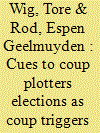

|
|
|
|
|
| Summary/Abstract |
A large proportion of coup attempts in autocracies occur in the aftermath of elections, yet little systematic research exists on the topic. Drawing on recent literature on elections in autocracies, we present an argument to explain postelection coups. While we recognize that electoral institutions have the potential to stabilize autocracies, we illustrate that the election event can spark instability when incumbents reveal electoral weakness. Electoral outcomes—in the form of vote shares and opposition reactions—are signals containing information about the strength of the opposition, and indirectly about the likelihood of a successful full-scale revolution that would compromise the privileged positions of regime elites. In these situations, coups are likely to be initiated to avoid a revolution, either by serving as concessions to the opposition or by facilitating increased repression. We perform a large-N study that supports our argument, significantly nuancing the claim that elections stabilize autocracies.
|
|
|
|
|
|
|
|
|
|
|
|
|
|
|
|
| 3 |
ID:
187552
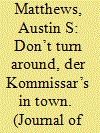

|
|
|
|
|
| Summary/Abstract |
How do dictators coup-proof their armed forces from within the barracks? Coup-proofing is an important aspect of autocratic survival, but execution can be challenging due to the secrecy of plots and the vast size of the armed forces. Counterbalanced state security forces are more effective at resisting coups, but less effective at noticing signs of plots before they can be launched. If dictators wish to prevent coup attempts from occurring in the first place, they may decide to recruit and commission cadres of loyalists directly into the armed forces as political officers, tasked with monitoring for and reporting signs of disloyalty within the ranks. This article explores the development and use of these political officers within dictatorships, arguing that they are especially effective at preventing coup attempts. It also makes the case that their institutional design, while effective at detecting coup plots, makes them less useful at resisting coups that have reached the execution phase. I test these arguments on a cross-national sample of dictatorships from 1950 to 2010, finding strong evidence that political officers are incredibly effective coup detectors, but not coup resisters. These findings have important implications, particularly as several resilient modern dictatorships continue to rule with well-developed political officer systems.
|
|
|
|
|
|
|
|
|
|
|
|
|
|
|
|
| 4 |
ID:
180626
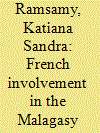

|
|
|
|
|
| Summary/Abstract |
In March 2009, President Marc Ravalomanana of the Island of Madagascar was ousted during a coup d’état led by the Mayor of Antananarivo, Andry Rajoelina, and his supporters. After the coup, Ravalomanana and his family fled to South Africa where they remained in exile from 2009 to 2014. To restore constitutional order in Madagascar, the Southern African Development Community (SADC), in July 2009, took the lead in a mediation process involving all Malagasy and other key stakeholders. SADC’s mediation efforts, led by former President Chissano, formally ended in 2013 with the holding of democratic elections. The mediation effort, which lasted five years, was conducted in a very competitive and ‘crowded’ field. The ‘crowded’ field was characterised by in-fighting amongst the various international bodies for power and influence including ‘spoiler’ tactics used by vested interests to hinder the mediation process and prevent the return of Ravalomanana to Madagascar. This article looks specifically at the ‘spoiler’ role that France played during the mediation process to safeguard her interests in Madagascar under the Sarkozy Administration. France is known to intervene in the political and economic affairs of her former colonies and, during the 2009 coup, this was no exception.
|
|
|
|
|
|
|
|
|
|
|
|
|
|
|
|
| 5 |
ID:
103724
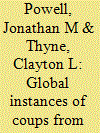

|
|
|
|
|
| Publication |
2011.
|
| Summary/Abstract |
Once considered a 'hot topic' among scholars, research on coups d'état has waned in recent years. This decline is surprising given that 7 coups have happened between January 2008 and December 2010, bringing the last decade's total to almost three dozen. One explanation for the lack of coup research is the absence of a temporally and spatially comprehensive dataset to test theories. Also absent is a discussion of what makes coups distinct from other forms of anti-regime activity. This article seeks to remedy these problems. The authors present a new dataset on coups from 1950 to 2010. They begin by explaining their theoretical definition and coding procedures. Next, they examine general trends in the data across time and space. The authors conclude by explaining why scholars studying a variety of topics, including civil wars, regime stability, and democratization, would benefit by paying closer attention to coups.
|
|
|
|
|
|
|
|
|
|
|
|
|
|
|
|
| 6 |
ID:
182689
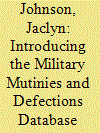

|
|
|
|
|
| Summary/Abstract |
Military mutinies are critical to scholars’ collective understanding of civil–military relations. This article introduces a new dataset that systematically codes mutinies across all regions and conducts an exploratory analysis of these new data. The primary contribution made here is the introduction of a new dataset that provides scholars with a sample of mutinies across region, space, and time. The new Military Mutinies and Defections Database (MMDD) codes events of military indiscipline from 1945 to 2017. This dataset uses geocoding techniques that will enable scholars to explore the spatial patterns and diffusion associated with mutinies. The second contribution is the preliminary exploration of these new data. Of note, I demonstrate that over one-third of all mutinies are violent, 6% of mutinies are associated with civilian deaths, and anocracies are more likely to experience mutinies than democratic or autocratic counterparts. MMDD provides investigators with an exciting new tool to explore dimensions of military disloyalty.
|
|
|
|
|
|
|
|
|
|
|
|
|
|
|
|
| 7 |
ID:
160785
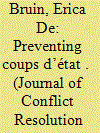

|
|
|
|
|
| Summary/Abstract |
Although coups remain a pressing concern for rulers across the globe, the mechanisms through which common coup-prevention strategies operate have not been well theorized or rigorously tested. This article analyzes how “counterbalancing” the military with other security forces prevents coups. Using new cross-national time-series data on state security forces along with evidence from sixteen case studies, the article demonstrates that counterbalancing reduces the likelihood that coup attempts will succeed and that it does so primarily by creating incentives for some soldiers to resist the coup, rather than by creating barriers to coordination between forces. However, counterbalancing is not associated with fewer coup attempts. In fact, the creation of a new security force increases the odds of a coup attempt in the following year. These findings highlight potential costs associated with counterbalancing and explain why it is not more widespread.
|
|
|
|
|
|
|
|
|
|
|
|
|
|
|
|
| 8 |
ID:
160979
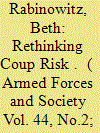

|
|
|
|
|
| Summary/Abstract |
Military interventions continue to be prevalent in Africa. In the 21st century alone, 14 coups have been successfully staged. Whereas most studies of coup risk examine how militaries are organized or what structural conditions are associated with coups, we take a novel approach. We explore how coalition politics relate to coup risk. It has long been observed that regimes try to hold power by buying off urban consumers. We argue that focusing on urban consumers actually makes regimes more prone to military intervention. Instead, leaders who ally with established rural elites are more effective at thwarting coups. To test our hypothesis, we develop a unique data set of rural political strategies, coding regimes in 44 sub-Saharan countries from 1960 to 2000. Using a continuous-time Cox proportional hazards regression model, we find a robust correlation between policies supportive of rural elites and lower coup risk.
|
|
|
|
|
|
|
|
|
|
|
|
|
|
|
|
| 9 |
ID:
169000
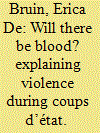

|
|
|
|
|
| Summary/Abstract |
Although just under half of all coup d’état attempts involve fatalities, there has been surprisingly little attention to the conditions under which coups turn violent. Existing research emphasizes the incentives coup plotters have to avoid bloodshed but does not explain the conditions under which violence nonetheless occurs. This article develops a theoretical framework that predicts that the extent of violence that occurs during coup attempts will vary systematically with central features of incumbent regimes and coup plotters. It then tests these predictions using new data on the fatalities associated with 377 coup attempts between 1950 and 2017. Coups against military regimes are found to be less violent than those against civilian dictatorships. This is because military rulers are better able to estimate the likelihood of the coup succeeding and more sensitive to the costs associated with using violence to suppress a coup. Since their post-coup fates tend to be better than those of other authoritarian leaders, they also have fewer incentives to hang on to power at any cost. The analysis also demonstrates that coups led by senior officers involve less bloodshed than those by junior officers and enlisted men. However, coups against rulers that counterbalance their militaries are no more violent than those against rulers that do not. The results shed new light on the dynamics of coup attempts.
|
|
|
|
|
|
|
|
|
|
|
|
|
|
|
|
|
|
|
|
|